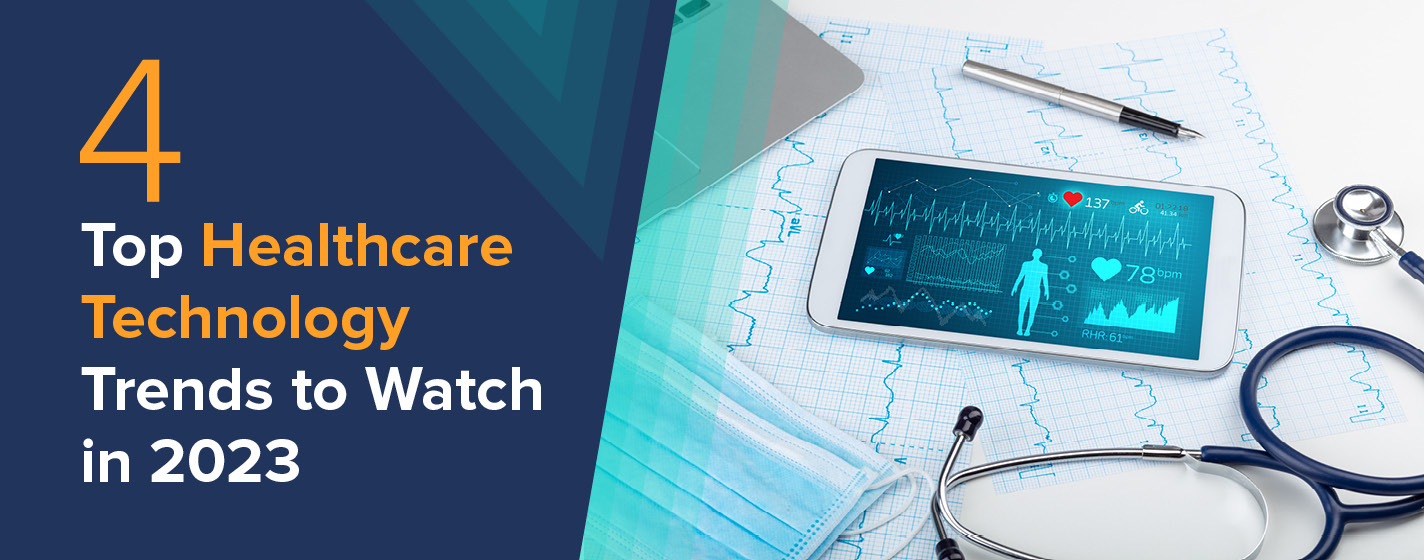Healthcare Technology Trends to Watch in 2023
Data analytics and technology are revolutionizing the healthcare industry. With each new advancement, trends in healthcare technology promise to improve standard care coordination and data management for increased patient satisfaction.
As technology develops, many industry leaders hope it will continue to improve efficiency, reduce costs, and offer better patient outcomes. However, the technological landscape rapidly changes, and some trends will be worth greater vigilance than others.
With this in mind, we’ll highlight four digital healthcare technology trends that your organization may benefit from tracking:
Before discussing each trend in detail, it’s important to acknowledge the role of these technologies. These technologies should be viewed as tools to assist in decision-making rather than as a replacement for clinicians or administrators. With this in mind, let’s begin.
1. Artificial Intelligence
There is a lot of buzz surrounding AI technologies and rightfully so, as the AI healthcare market is measured to be worth $38 billion by 2027. AI’s range of applications is diverse and is expanding as new case studies arise.
AI technology adoption can improve decision-making across the following processes and more:
- Predictive analytics: As a major reason for AI adoption, predictive analytics can help clinicians leverage care insights and provide effective early patient intervention. This means that patients enjoy timely and accurate treatment plans while healthcare staff can adequately allocate resources.
- Patient engagement: AI chatbots enable patients and providers to rely on remote monitoring solutions that facilitate appointed scheduling, secure messaging, and offer educational resources for patients to learn more.
- Donor engagement and fundraising: AI-powered analytics can identify donor preferences, segment existing donor populations, and predict giving patterns. As a result, care facilities can raise support more efficiently and devote more time to improving their quality of care.
Today’s healthcare analytics are powered by AI tools that clinicians can use to control data quality and interpret results in a timely manner. These scalable tools offer the above capabilities, allowing clinicians to sift through large volumes of data and access a complete view of every patient.
2. Cloud Integration
Cloud computing services are lowering IT costs, and the global cloud computing market is expected to grow by $89.4 billion by 2027. Cloud integration solves major challenges associated with care delivery and communication as providers who use it are able to manage EHRs, emails, and other time-sensitive data within its platform.
More specifically, successful cloud integrations can transform traditional health systems by providing access to:
- Enhanced collaboration: Medical professionals and administrators can collectively problem-solve by accessing easily transferable updated files.
- Effective record management: Cloud platforms provide a clean, accessible way to access patient data through EHR integration. This electronic solution eliminates chart chasing, enabling providers to make more informed decisions at the point of care.
- Scalable insights: When all patient data is gathered in one secure system, providers can investigate details, such as demographic information and medical histories, to unearth valuable insights and pinpoint population health patterns.
Cloud integration is not limited to direct care providers. Many nonprofit leaders integrate cloud-based into their existing healthcare fundraising, marketing, and donor management systems.
Adopting cloud-computing CRM platforms like Blackbaud or Salesforce can help decrease administrative burdens significantly while helping organizations stay ahead.
3. Enhanced Data Privacy and Security
Because of recent technological advancements, healthcare organizations must take special precautions to prevent data leaks. Not doing so, will result in data breaches of sensitive patient information. Implement thoughtful and robust data security measures, including:
- Encrypted data storage: Healthcare data warehouses are useful analytics tools that store and organize clinical data. Correctly built warehouses include data encryption to protect raw patient data from unauthorized access.
- Continuous auditing: To keep their platforms usable, healthcare organizations must perform regular audits to remove duplicate, out-of-date, or inaccurate data. This will ensure that all constituent profiles are functional and have not been tampered with.
- Access and controls monitoring: Privacy and security settings must be checked and tested often to ensure permissions are only given to authorized parties.
Keeping a clean data set is essential to protect sensitive information from data breaches and maintain your organization’s reputation. To standardize your database, NPOInfo’s guide to data hygiene suggests starting with a full database audit. Share your findings with your team to identify any gaps in your data collection and brainstorm solutions for improved performance.
4. Personalized Healthcare
Newer technologies promise patients more opportunities for personalized care. This means that clinicians can offer individualized treatment plans and patients now have more choices when picking their healthcare plan. Precision medicine based on social determinants of health (SGoH), like age or risk factors, falls under this category.
For example, Arcadia Analytics utilizes tailored dashboards to measure SDoH KPIs to understand what is happening in a patient’s life outside of the waiting room. These dashboards report patterns or trends that might have severe clinical ramifications. Measures like demographics, geoanalysis, and language concerns are all analyzed, so clinicians can assess their patients in fine-grain detail.
Other aspects of personalized healthcare include flexible telemedicine appointments, remote patient monitoring like wearable technologies, and even advanced genetic testing.
AI and cloud integration are streamlining previously burdensome tasks and providing a place for clinicians and administrators alike to meaningfully collaborate. This opens the door to better patient care and informed administrative decisions. That said, organizations must take appropriate data security measures to prioritize the safety and security of their patients as new advancements emerge.

